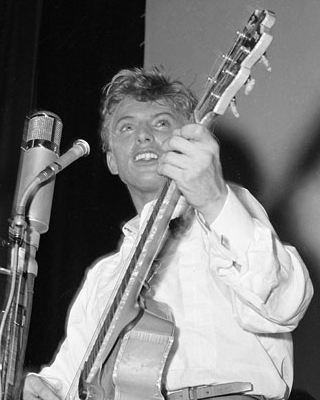
Sir Thomas Hicks, known professionally as Tommy Steele, is an English entertainer, regarded as Britain's first teen idol and rock and roll star.

"Shake, Rattle and Roll" is a song, written in 1954 by Jesse Stone. The original recording by Big Joe Turner is ranked number 127 on the Rolling Stone magazine's list of The 500 Greatest Songs of All Time.

Marty Wilde, is an English singer and songwriter. He was among the first generation of British pop stars to emulate American rock and roll, scoring several 1950s hit singles including "Endless Sleep", "Sea of Love" and "Bad Boy". During the 1960s and 1970s, Wilde continued to record and, with Ronnie Scott, co-wrote hit singles for others including the Casuals' "Jesamine" and Status Quo's "Ice in the Sun". He is the father of pop singer Kim Wilde and co-wrote many of her hit singles including "Kids in America" with his son Ricky. He continues to perform and record.
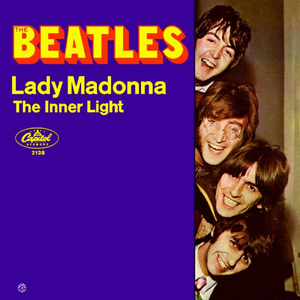
"Lady Madonna" is a song by the English rock band the Beatles, written primarily by Paul McCartney and credited to Lennon–McCartney. In March 1968, it was released as a mono single, backed with "The Inner Light". The song was recorded on 3 and 6 February 1968 before the Beatles left for India, and its boogie-woogie style signalled a more conventional approach to writing and recording for the group following the psychedelic experimentation of the previous two years.

"Tweedlee Dee" is a rhythm and blues novelty song with a Latin-influenced riff written by Winfield Scott for LaVern Baker and recorded by her at Atlantic Records' studio in New York City in 1954. It was her first hit, reaching number 4 on Billboard magazine's R&B chart and number 14 on its pop chart. It was Scott's first commercially successful song.

"Return to Sender" is a song recorded by American singer Elvis Presley and performed in the film Girls! Girls! Girls!. The song was written by Winfield Scott and Otis Blackwell to suit Presley's rock and roll musical style. The singer laments his relationship with a spiteful partner. Released on October 2, 1962, and published by Elvis Presley Music, the song became a commercial hit and received praise for its lyricism and melody.
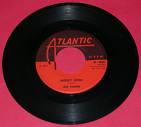
"Honey Hush", is a blues song, written by Big Joe Turner, recorded in May 1953 in New Orleans, Louisiana, and released that August by Atlantic Records. It was a number-one song on Billboard's Rhythm and Blues chart for eight weeks.
Q-Tips were a blue-eyed soul and new wave rock band from Britain, first formed in 1979 from the remnants of the rock group Streetband.
Anthony John Kronenberg, known professionally as Tony Crombie, was an English jazz drummer, pianist, bandleader, and composer. He was regarded as one of the finest English jazz drummers and bandleaders, an occasional but capable pianist and vibraphonist, and an energizing influence on the British jazz scene over six decades.

Rock 'n Roll Stage Show is the first studio album and fourth overall album by rock and roll band Bill Haley and His Comets. Released by Decca Records in August 1956, it was the group's first album to include new, as opposed to previously released material. Although the album spawned several singles, it also featured several album-only tracks.
Warren Covington was an American big band trombonist. He was active as a session musician, arranger, and bandleader throughout his career.
Mike Elliott is a saxophonist who was born in Jamaica on 6 August 1929. He played on ska recordings in the early 1960s and on pop and soul music hits in the late 1960s. He is best known as a co-founding member of the British band The Foundations, and played on their hit singles "Baby, Now That I've Found You" and "Build Me Up Buttercup".

Bright Lights & Back Alleys is the fourth studio album by the English rock band Smokie, released on 29 September 1977 in continental Europe and 7 October in the United Kingdom by RAK Records. Recorded primarily at Whitney Recording Studios in Glendale, California, from March to April 1977, it was produced by Mike Chapman and Nicky Chinn, as were the band's all previous albums.
British rock and roll, or sometimes British rock 'n' roll, is a style of popular music based on American rock and roll, which emerged in the late 1950s and was popular until the arrival of beat music in 1962. It was important in establishing British youth and popular music culture and was a key factor in subsequent developments that led to the British Invasion of the mid-1960s. Since the 1960s, some stars of the genre, most notably Cliff Richard, have managed to sustain successful careers and there have been periodic revivals of this form of music.

"Rudy's Rock" is a 1956 instrumental composed by Bill Haley and Rudy Pompilli and released as a Decca single. The song appeared in the 1956 Columbia Pictures movie Rock Around the Clock.

The Tommy Steele Story is a 1957 British film directed by Gerard Bryant and starring Tommy Steele, dramatising Steele's rise to fame as a teen idol. Along with Rock You Sinners, it was one of the first British films to feature rock and roll. In the US, where Steele was not well-known, the film was released under the title Rock Around the World. The film was announced in January 1957, three months after the release of Steele's first single "Rock with the Caveman".

"What a Mouth " is a music hall song written by R. P. Weston in 1906 and first sung by Harry Champion. It is better known for the version recorded by Tommy Steele in 1960, which peaked at number 5 on the UK Singles Chart.
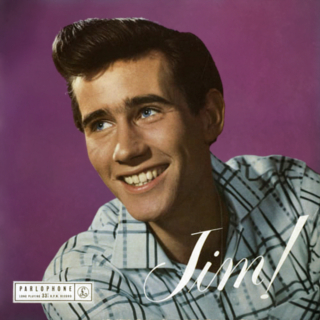
Jim! is the first studio album by the English actor, singer and songwriter Jim Dale, credited to Dale with Ken Jones and his Orchestra and the Michael Sammes Singers. Released as a 10-inch LP on EMI's Parlophone label in March 1958, Jim! was produced by the label's head George Martin and has been cited as "the first British rock and roll LP". It was Dale's only album released during his initial fame as a teen idol; he quit recording to pursue comedy soon after its release.

Tommy Steele Stage Show is a live album by English entertainer Tommy Steele, released as a 10-inch LP by Decca in March 1957. A concert recording of Steele backed by the Steelmen at London's Conway Hall, it was his first album release and features a version of the hit single "Rock with the Caveman" alongside several covers of American songs including three previously recorded by Hank Williams. The album's release followed Steele's swift rise to fame as a teen idol widely considered Britain's first rock and roll star, and the success of his UK Singles Chart number one "Singing the Blues". It received a muted critical reception but was commercially successful, peaking at number five on the UK Albums Chart.
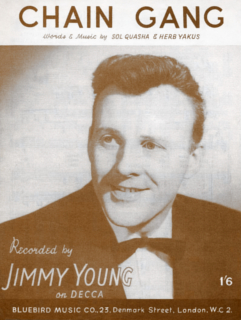
"Chain Gang" is a 1955 song written by Sol Quasha and Herb Yakus. In 1956, a recording by American singer Bobby Scott reached number 13 on the US Billboard Hot 100, whilst a version by English singer Jimmy Young peaked at number 9 on the UK Singles Chart. A work song, its chart success followed that of the similarly themed "Sixteen Tons", a transatlantic number one for Tennessee Ernie Ford.















